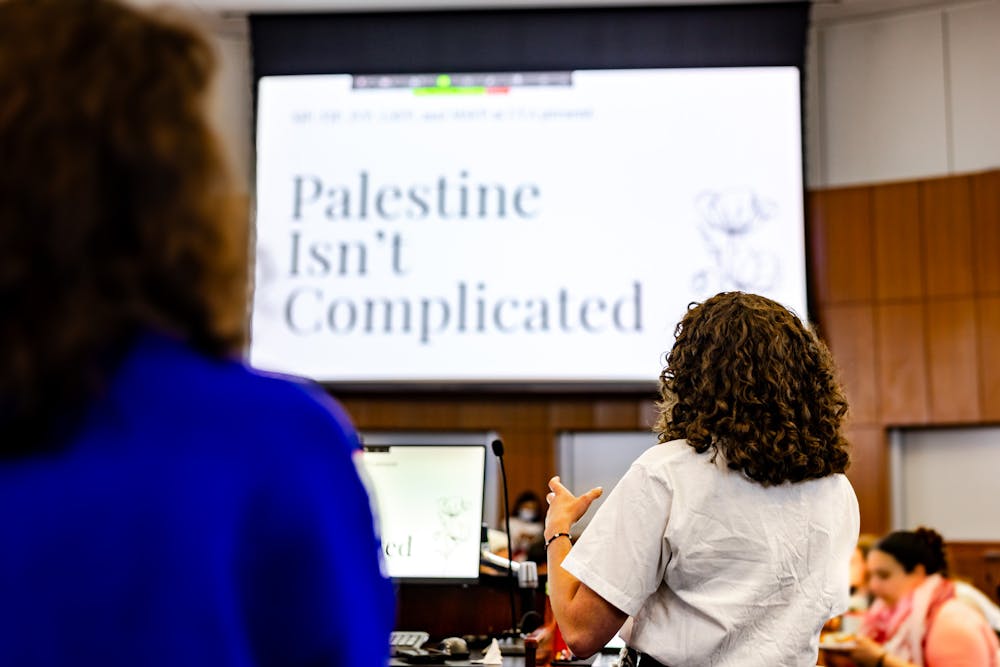Student-run activist organization Students for Justice in Palestine announced the creation of the U.Va. Apartheid Divest coalition at a teach-in event Tuesday, which also included presentations on history and current events related to the ongoing war between Israel and Hamas in Gaza. SJP hosted the event, titled “Palestine: It’s Not Complicated,” in collaboration with the University chapters of Faculty for Justice in Palestine, Jewish Voice for Peace, Law Students for Palestine and Medical Students for Palestine.
According to the organization’s mission statement, U.Va. Apartheid Divest is a coalition that “serves to unite U.Va. students and their organizations in their struggle against imperialism, colonialism and militarism in pursuit of collective liberation.”
The president of Students for Justice in Palestine, who requested to remain anonymous, said the new coalition aims to organize people who believe in freedom for everyone.
“We’re focused on Israel and Israeli apartheid, but we really are a movement for justice all around the world,” SJP’s president said. “What we saw was an opportunity to build a movement far more broadly.”
The new coalition introduced a series of demands for the University at Tuesday's event. Among these demands was a call for the University of Virginia Investment Management Company, which determines how the University invests its roughly $13.6 billion endowment, to submit itself to an external audit to determine to what extent the University is financially connected to corporations engaged in human rights violations.
The coalition also demanded the University divest from weapons manufacturers and end research collaborations with any company connected to Israeli human rights violations.
According to Gaza’s Ministry of Health, Israeli attacks on Gaza have killed over 27,000 Palestinian individuals since Hamas’ Oct. 7 raid on Israel that killed over 1,000 civilians. Israel has also blocked humanitarian aid efforts in the region, causing shortages of food, potable water and fuel, per the Human Rights Watch.
Further demands from the coalition include additional support for Palestinian students, recognition of their identity, an official comment condemning suppression of pro-Palestinian speech on and off Grounds and formal acknowledgement of a distinction between anti-zionism and antisemitism. Zionism refers to a political ideology advocating for a Jewish state in the Middle East, a movement that originated in the 19th century and culminated when the state of Israel was established in 1948.
A representative of Medical Students for Palestine who also spoke at the event said that while the University has protected students’ right to speak and organize, free speech protections are still under attack.
“SJP has organized marches and walkouts and different advocacy events … and we have not faced any institutional backlash for it,” the representative said. “I am aware of the threats that have been posed to those freedoms by the Board of Visitors, alumni and donors and such, trying to pressure the administration to lessen their tolerance of our kind of organizing.”
The divestment initiative, which began after SJP’s walkout in October, currently has over two dozen signatories and is supported by organizations including UDems, Black Student Alliance, Asian Student Union, Queer Student Union and Divest U.Va.
The coalition also introduced its goal of acquiring 950 signatures on a petition within the next two weeks, which would allow U.Va. Apartheid Divest to pose a “non-binding question of opinion” to the entirety of the University’s student body, per University Board of Elections policy.
U.Va. Apartheid Divest’s petition surpassed 950 signatures in less than 48 hours, so the referendum — which enables students to weigh in on the question of divestment and reiterates demands the coalition presented on Tuesday — will be presented to the student body during this year’s student election cycle, which begins Feb. 26. Non-binding questions of opinion, such as this referendum on divestment, can be used to provide the University administration a clearer sense of where students stand on a particular issue.
In addition to introducing the new coalition and its upcoming ballot measure, the teach-in event featured a series of student and faculty speakers who spoke about the history of Israel and Palestine and the effect that Israeli laws have on Palestinians. According to one presenter, the overarching purpose of the event was to dispel the idea that discourse surrounding Israel and Palestine is so complicated that it is not worth engaging in.
“[The name of the event] is not intended to minimize the issue by any stretch,” the speaker said. “If we use the seeming complexity of this issue to actually engage with it and educate ourselves as opposed to the all-too-common response of letting it discourage us from trying to engage with it, then it becomes much less of a black box.”
Students for Justice in Palestine will host another teach-in Feb. 20 focusing on the importance of divestment and how it can impact the conflict in Gaza.
CORRECTION: A previous version of this article stated that Gaza’s Ministry of Health reported that Israeli attacks on Gaza have killed over 27,000 Palestinian civilians. Gaza’s Ministry of Health does not distinguish between civilian and combatant deaths, so this figure refers instead to the total number of Palestinian individuals that have been killed during the Israel-Hamas war. The article has since been updated to reflect this change.







